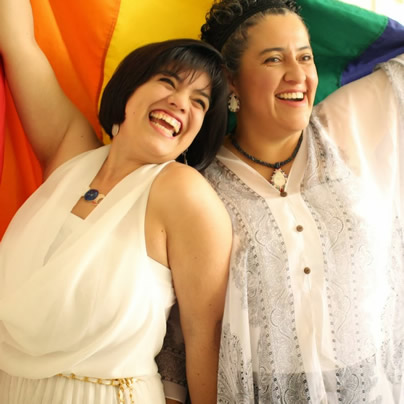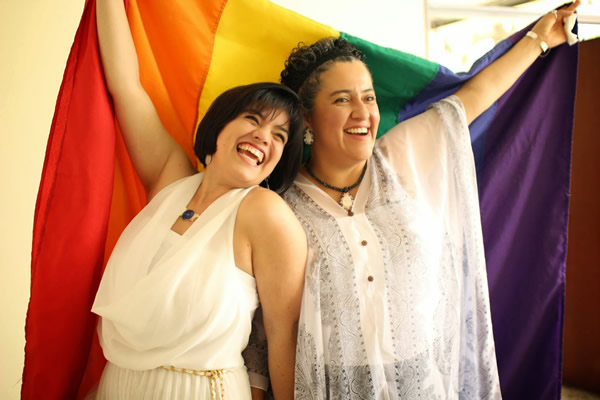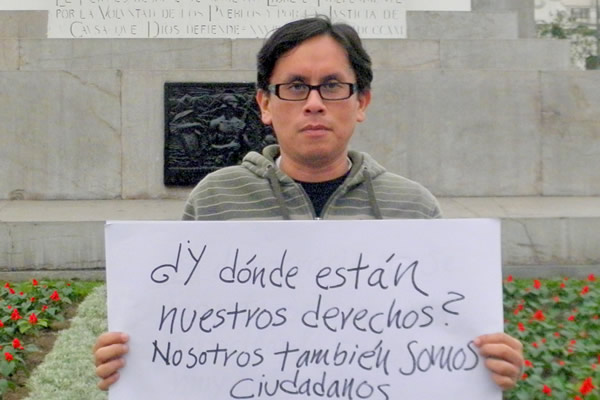News
Marriage efforts in Latin America advance amid resistance
A Colombian judge annulled a gay couple’s marriage on October 2.


Caludia Zea and Elizabeth Castillo married in Gachetá, Colombia, on September 25. (Photo by Paola Zuluaga)
A civil judge in Bogotá, the Colombian capital, on September 20 married Julio Albeiro Cantor Borbón and William Alberto Castro Franco. Elizabeth Castillo and Claudia Zea tied the knot five days later in a ceremony in Gachetá in the province of Cundinamarca that Judge Julio González officiated.
Another Bogotá judge on October 4 married Adriana Elizabeth González and Sandra Marcela Rojas.
Colombia’s Constitutional Court in 2011 ruled gays and lesbians could seek legal recognition of their relationships within two years if lawmakers in the South American country did not extend to them the same benefits heterosexuals receive through marriage.
The Colombian Senate in April overwhelmingly rejected a bill that would have extended marriage rights to gays and lesbians. And the Constitutional Court’s June 20 deadline passed amid lingering confusion as to whether same-sex couples could actually marry in the country.
Many notaries have said they will allow gays and lesbians to enter into a “solemn contact” as opposed to a civil marriage.
A Bogotá judge in July solemnized Carlos Hernando Rivera Ramírez and Gonzalo Ruiz Giraldo’s relationship. Marcela Sánchez, executive director of Colombia Diversa, an LGBT advocacy group, and other activists maintain the two men and other same-sex couples whose relationships have been formally recognized are legally married.
“I am not doing any type of favor; it is not important that I may be sympathetic to the LGBTI movement or that I am from a liberal political group,” Julio González told the Colombian newspaper El Espectador after he married Castillo and Zea. “These things cannot dictate whether a judge acts according to the law and the Constitution.”
A Bogotá judge on October 2 annulled Cantor and Castro’s marriage after a group opposed to nuptials for gays and lesbians challenged it in court. The organization has said it plans to file suit against Julio González and other judges who have officiated same-sex marriages.
Out Bogotá City Councilwoman Angélica Lozano on September 30 also filed a complaint against Inspector General Alejandro Ordoñez, who vehemently opposes nuptials for gays and lesbians, for ordering notaries to report any same-sex couple who seeks a marriage licenses to his office.
“I am legally denouncing the inspector general for abuse of power, arbitrary acts and injustices against homosexuals,” Lozano tweeted after she filed her complaint.
Mexican, Chilean advocates push for marriage
Argentina and Uruguay are among the 14 countries in which gays and lesbians can legally marry.
Brazil’s National Council of Justice in May ruled registrars in the South American country cannot deny marriage licenses to same-sex couples. São Paulo and other Brazilian states had already extended marriage rights to same-sex couples, but the country’s lawmakers have yet to pass a nationwide gay nuptials bill.
The Mexican Supreme Court in February unveiled its decision that found a law in the state of Oaxaca that bans same-sex marriage unconstitutional.
Same-sex couples have been able to legally marry in Mexico City since 2010, and the Mexican Supreme Court has ruled that states must recognize these unions.
A gay couple in Mérida on the Yucatán Peninsula exchanged vows in August after a federal judge said they could tie the knot. Judges in the states of Chihuahua and México in recent months have also ruled in favor of same-sex couples seeking marriage rights.
Gays and lesbians in Jalisco, in which the resort city of Puerto Vallarta is located, and other Mexican states have also begun to petition local authorities to allow them to marry.
Chilean LGBT rights advocates continue to pressure President Sebastián Piñera to allow gays and lesbians to tie the knot after the Inter-American Court of Human Rights in July gave the country’s government a two month deadline to respond to a same-sex marriage lawsuit the group Movement for Homosexual Integration and Liberation (Movilh) filed in 2012.
Movilh said in an October 3 press release that two members of Piñera’s cabinet with whom it met assured them the government has already begun the “process of internal consultations” to respond to its lawsuit.
More than 40 Chilean lawmakers on October 8 urged Piñera to make a bill that would allow gays and lesbians to enter into civil unions a priority before he leaves office early next year.
Former President Michelle Bachelet, who is the frontrunner to succeed Piñera in the country’s presidential elections that will take place on November 17, earlier this year publicly backed marriage rights for same-sex couples.
“More than two million people live together in Chile and they find a lack of this law socially and judicially indefensible,” the letter to Piñera reads. “They remind you that your presidential platform clearly referenced these topics.”
Civil unions bill introduced in Perú
Peruvian Congressman Carlos Bruce last month introduced a bill that would allow same-sex couples to enter into civil unions. It would extend economic benefits to them, but not adoption rights.
Victor Cortez and his boyfriend, Antonio Capurro, formed the group Plural Perú to help build support for the civil unions measure and expanded LGBT rights in the country. The two activists told the Washington Blade during an interview from the Peruvian capital of Lima on Tuesday the bill faces an uphill battle before lawmakers consider it in March.
A recent poll found 65 percent of Peruvians oppose any efforts to allow same-sex couples to enter into a civil union. Lima Archbishop Juan Luis Cipriani and Evangelicals are among those who frequently speak out against gays and lesbians and any proposal to legally recognize their relationships.
Cortez told the Blade he feels machismo and conservative attitudes within Peruvian society will continue to hamper efforts to extend marriage rights to same-sex couples.
“These types of unions go against these values,” he said. “For them this is very unacceptable.”
Kansas
ACLU sues Kansas over law invalidating trans residents’ IDs
A new Kansas bill requires transgender residents to have their driver’s licenses reflect their sex assigned at birth, invalidating current licenses.

Transgender people across Kansas received letters in the mail on Wednesday demanding the immediate surrender of their driver’s licenses following passage of one of the harshest transgender bathroom bans in the nation. Now the American Civil Liberties Union is filing a lawsuit to block the ban and protect transgender residents from what advocates describe as “sweeping” and “punitive” consequences.
Independent journalist Erin Reed broke the story Wednesday after lawmakers approved House Substitute for Senate Bill 244. In her reporting, Reed included a photo of the letter sent to transgender Kansans, requiring them to obtain a driver’s license that reflects their sex assigned at birth rather than the gender with which they identify.
According to the reporting, transgender Kansans must surrender their driver’s licenses and that their current credentials — regardless of expiration date — will be considered invalid upon the law’s publication. The move effectively nullifies previously issued identification documents, creating immediate uncertainty for those impacted.
House Substitute for Senate Bill 244 also stipulates that any transgender person caught driving without a valid license could face a class B misdemeanor, punishable by up to six months in jail and a $1,000 fine. That potential penalty adds a criminal dimension to what began as an administrative action. It also compounds the legal risks for transgender Kansans, as the state already requires county jails to house inmates according to sex assigned at birth — a policy that advocates say can place transgender detainees at heightened risk.
Beyond identification issues, SB 244 not only bans transgender people from using restrooms that match their gender identity in government buildings — including libraries, courthouses, state parks, hospitals, and interstate rest stops — with the possibility for criminal penalties, but also allows for what critics have described as a “bathroom bounty hunter” provision. The measure permits anyone who encounters a transgender person in a restroom — including potentially in private businesses — to sue them for large sums of money, dramatically expanding the scope of enforcement beyond government authorities.
The lawsuit challenging SB 244 was filed today in the District Court of Douglas County on behalf of anonymous plaintiffs Daniel Doe and Matthew Moe by the American Civil Liberties Union, the ACLU of Kansas, and Ballard Spahr LLP. The complaint argues that SB 244 violates the Kansas Constitution’s protections for personal autonomy, privacy, equality under the law, due process, and freedom of speech.
Additionally, the American Civil Liberties Union filed a temporary restraining order on behalf of the anonymous plaintiffs, arguing that the order — followed by a temporary injunction — is necessary to prevent the “irreparable harm” that would result from SB 244.
State Rep. Abi Boatman, a Wichita Democrat and the only transgender member of the Kansas Legislature, told the Kansas City Star on Wednesday that “persecution is the point.”
“This legislation is a direct attack on the dignity and humanity of transgender Kansans,” said Monica Bennett, legal director of the ACLU of Kansas. “It undermines our state’s strong constitutional protections against government overreach and persecution.”
“SB 244 is a cruel and craven threat to public safety all in the name of fostering fear, division, and paranoia,” said Harper Seldin, senior staff attorney for the ACLU’s LGBTQ & HIV Rights Project. “The invalidation of state-issued IDs threatens to out transgender people against their will every time they apply for a job, rent an apartment, or interact with police. Taken as a whole, SB 244 is a transparent attempt to deny transgender people autonomy over their own identities and push them out of public life altogether.”
“SB 244 presents a state-sanctioned attack on transgender people aimed at silencing, dehumanizing, and alienating Kansans whose gender identity does not conform to the state legislature’s preferences,” said Heather St. Clair, a Ballard Spahr litigator working on the case. “Ballard Spahr is committed to standing with the ACLU and the plaintiffs in fighting on behalf of transgender Kansans for a remedy against the injustices presented by SB 244, and is dedicated to protecting the constitutional rights jeopardized by this new law.”
National
After layoffs at Advocate, parent company acquires ‘Them’ from Conde Nast
Top editorial staff let go last week

Former staff members at the Advocate and Out magazines revealed that parent company Equalpride laid off a number of employees late last week.
Those let go included Advocate editor-in-chief Alex Cooper, Pride.com editor-in-chief Rachel Shatto, brand partnerships manager Erin Manley, community editor Marie-Adélina de la Ferriére, and Out magazine staff writers Moises Mendez and Bernardo Sim, according to a report in Hollywood Reporter.
Cooper, who joined the company in 2021, posted to social media that, “Few people have had the privilege of leading this legendary LGBTQ+ news outlet, and I’m deeply honored to have been one of them. To my team: thank you for the last four years. You’ve been the best. For those also affected today, please let me know how I can support you.”
The Advocate’s PR firm when reached by the Blade said it no longer represents the company. Emails to the Advocate went unanswered.
Equalpride on Friday announced it acquired “Them,” a digital LGBTQ outlet founded in 2017 by Conde Nast.
“Equalpride exists to elevate, celebrate and protect LGBTQ+ storytelling at scale,” Equalpride CEO Mark Berryhill said according to Hollywood Reporter. “By combining the strengths of our brands with this respected digital platform, we’re creating a unified ecosystem that delivers even more impact for our audiences, advertisers, and community partners.”
It’s not clear if “Them” staff would take over editorial responsibilities for the Advocate and Out.

In an official statement released at the reveal event Capital Pride Alliance described its just announced 2026 Pride theme of “Exist, Resist, Have the Audacity” as a “bold declaration affirming the presence, resilience, and courage of LGBTQ+ people around the world.”
The statement adds, “Grounded in the undeniable truth that our existence is not up for debate, this year’s theme calls on the community to live loudly and proudly, stand firm against injustice and erasure, and embody the collective strength that has always defined the LGBTQ+ community.”
In a reference to the impact of the hostile political climate, the statement says, “In a time when LGBTQ+ rights and history continue to face challenges, especially in our Nation’s Capital, where policy and public discourse shape the future of our country, together, we must ensure that our voices are visible, heard, and unapologetically centered.”
The statement also quotes Capital Pride Alliance CEO and President Ryan Bos’s message at the Reveal event: “This year’s theme is both a declaration and a demand,” Bos said. “Exist, Resist, Have Audacity! reflects the resilience of our community and our responsibility to protect the progress we’ve made. As we look toward our nation’s 250th anniversary, we affirm that LGBTQ+ people have always been and always will be part of the United States’s history, and we will continue shaping its future with strength and resolve,” he concluded.
-

 Mexico5 days ago
Mexico5 days agoUS Embassy in Mexico issues shelter in place order for Puerto Vallarta
-

 Netherlands4 days ago
Netherlands4 days agoRob Jetten becomes first gay Dutch prime minister
-

 Sports4 days ago
Sports4 days agoMore than a dozen LGBTQ athletes medal at Olympics
-

 Books3 days ago
Books3 days agoNew book profiles LGBTQ Ukrainians, documents war experiences
















